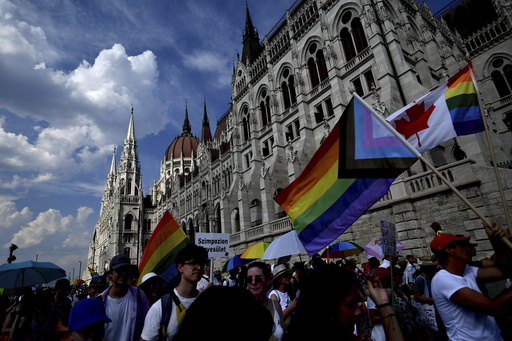In Budapest, Hungary’s LGBTQ+ community is gearing up for a confrontation with the country’s government, which has taken autocratic measures against them. Despite facing a government ban and potential legal repercussions, organizers plan to move forward with a pride march in the capital on Saturday. Earlier this year, Prime Minister Viktor Orbán’s populist party swiftly passed a law that criminalizes holding or attending events that “depict or promote” homosexuality to minors under 18. Orbán explicitly identified Budapest Pride—celebrating its 30th anniversary this year—as a primary focus of this new legislation.
On Friday, those behind Pride, alongside Budapest Mayor Gergely Karácsony, the European Commissioner Hadja Lahbib, and Nicolae Stefanuta, Vice President of the European Parliament, vowed that the march would proceed on Saturday, despite threats of severe fines and potential jail time for those involved, including the liberal mayor. Leaders are predicting that this event will be the largest Pride gathering ever seen in Hungary. During a news conference, Karácsony remarked on the government’s tactics, saying, “The government is always fighting against an enemy against which they have to protect Hungarian people … This time, it is sexual minorities that are the target.” He proclaimed, “We believe there should be no first and second class citizens, so we decided to stand by this event.”
Observers have compared Hungary’s recent ban on Pride and other measures against LGBTQ+ individuals to similar laws in Russia. The newly enacted legislation permits the use of facial recognition technology to identify attendees at prohibited gatherings, with potential fines reaching 200,000 Hungarian forints (approximately $586). Considered Putin’s closest ally within the European Union, Orbán has also restricted same-sex adoption and outlawed LGBTQ+ content accessible to minors, including on television, in films, and in literature. The Hungarian administration justifies these measures by claiming that exposure to LGBTQ+ material harms children’s development. However, critics argue these policies are part of a broader effort to scapegoat sexual minorities to bolster support from conservative voters.
Efforts by Pride organizers to officially register their march through police channels were blocked, prompting Karácsony to back the march as a separate city-sponsored event, which he argues does not require police consent. Nevertheless, the government stands its ground, asserting that the Pride march would be illegal, even as a municipal event. In a recent video statement, Hungary’s justice minister, Bence Tuzson, cautioned that involvement in Pride could result in up to a year of imprisonment. During a press conference, Karácsony sought to alleviate concerns of hefty fines for participants, reassuring, “Police have only one task tomorrow: to guarantee the safety and security of those gathered at the event.” Speaking on state radio, Orbán remarked that while legal consequences might ensue for attending Pride, they “can’t reach the level of physical abuse” and emphasized that Hungary remains a “civilized country.”
Meanwhile, right-wing entities are organizing counter-demonstrations. The Our Homeland Movement, a radical right-wing party, has pursued police authorization to hold rallies at various spots throughout the city, including along the Pride march route. Additionally, a neo-Nazi group plans to assemble at Budapest City Hall, the starting point for the Pride event, declaring exclusionary participation criteria: only “white, Christian, heterosexual men and women” are welcome at their rally.
International response to Hungary’s Pride ban has been significant, eliciting objections from numerous partners and allies. Over 30 foreign embassies have affirmed their commitment to equal rights, highlighting issues of nondiscrimination, freedom of expression, and peaceful assembly. European Commission President Ursula von der Leyen called on Hungarian authorities via social platform X to permit Pride to proceed without fear of repercussions for organizers or participants. In defiance of the ban, more than 70 members of the European Parliament and officials from various European nations plan to join Saturday’s march. On Friday, Lahbib emphasized the international attention now focused on Budapest, asserting that the EU must not remain passive and cannot tolerate intolerance.


